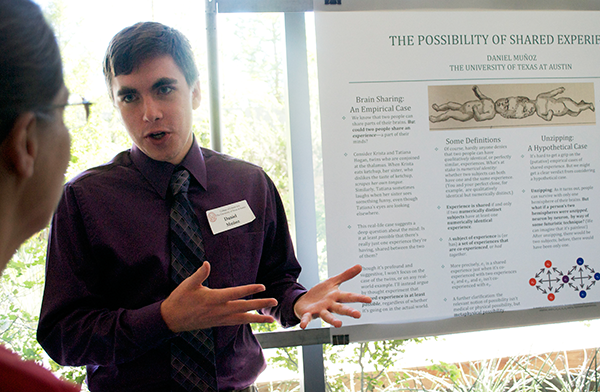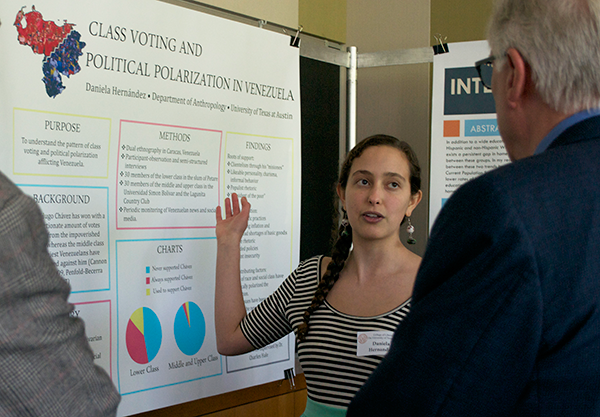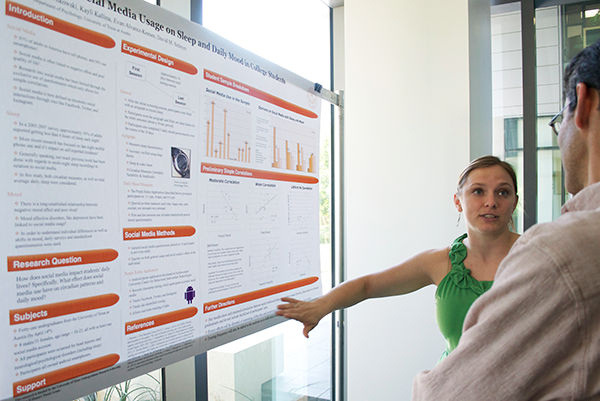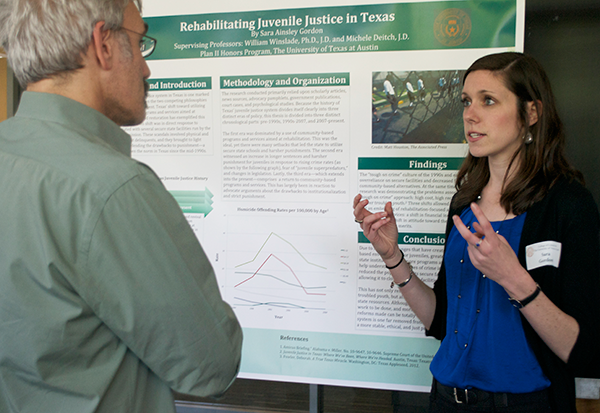April 14-18 is Undergraduate Research Week at UT, hosted by the Senate of College Councils and the Office of the Dean of Undergraduate Studies. Colleges and organizations across campus, including the College of Liberal Arts, coordinate events throughout the week to showcase the work of undergraduate researchers.
On April 15, a group of 11 outstanding liberal arts researchers presented their research at the Liberal Arts Undergraduate Research Reception, hosted by Dean Randy Diehl. A committee selected the top research posters from participants of the Honors Day Poster Presentation on April 12 and asked them to present to college directors, chairs, deans and faculty at the reception.
Four of those presenters answered questions about their research motivation, process and experiences below.
Political Polarization in Venezuela
Daniela Hernández, an anthropology senior from Caracas, Venezuela, conducted research on the political polarization in her home country. The purpose of her study is to understand the reasons and motivations behind the pattern of class voting that has characterized Venezuelan elections during the past 14 years by exploring the ways Venezuelans develop their political affiliations.
How did you decide on this research topic?
Venezuela is one of the top five countries in the world when it comes to overall per capita homicide rate, while kidnappings and armed robberies are also pervasive throughout the region. On the economic side, Venezuela is experiencing massive shortages and one of the highest inflation rates in the world. The severity of these issues, combined with the problem of political polarization, has made Venezuela a very unstable country, as demonstrated by the protests and violent conflict currently taking place throughout Venezuela. I chose to do this research because if Venezuelans are to fix these issues and regain stability across the nation there needs to be an understanding between the two political factions. My research can be instrumental to this process because it offers the perspectives of both sides.
Who was your mentor for this project?
Dr. Charles Hale, director of LILLAS.
What kind of work went into your research?
I conducted a dual ethnography, through which I attempted to capture the perspective of each political faction (i.e. the opposition vs. the Chávez supporters). This dual ethnography took place in Caracas, Venezuela and involved participant-observation and semi-structured interviews during the course of eight weeks. I also undertook an analysis of the news and social media in order to understand how these mediums are used to mold political opinion and accumulate political support for each group.
What kind of impact do you think this research could have?
Despite the amount of research that has already been done, my study can still be considered an important contribution because it offers an anthropological outlook on the issue, whereas the existing literature is predominantly in the field of political science. Moreover, most of the studies that have already been done were conducted while Chávez was in power, meaning that there was still room for change. My research, on the other hand, took place in the wake of the Chávez regime, which allowed me to examine the issue in its entirety.
What element of your research did you find most fascinating?
The most fascinating part of my research was the deep state of paranoia I witnessed amongst the general Venezuelan population. Initially, very few people wanted to let me interview them, becoming extremely suspicious as soon as I mentioned the political nature of my research. The reason for this is that the Chávez administration employed many coercive methods to scare people into supporting him, so people feared that I was some type of government spy.
However, many Venezuelans now fear losing their jobs or any other service that is crucial to their wellbeing, even if they do not work directly for the government or receive government assistance. This is because many businesses and services that people use on a day-to-day basis, such as electricity, internet, water, currency exchange, and so on, are either controlled or associated with the government.
How has your research impacted your outlook on the world?
It has changed the way I perceive myself as a member of the opposition and the Venezuelan middle-class. Thanks to my research, I have realized that the issue is not as simple as one of good vs. evil, where the opposition is the martyr fighting against the evil chavistas. There are a myriad of reasons why people support Chávez and it is not fair to categorize them as “ignorant” simply for doing so.
Moreover, I now recognize how the Venezuelan middle and upper class has also played a role in the current state of polarization by perpetuating long-standing racist and classist stereotypes about the lower class.
Has your experience changed what you want to do after graduation?
Yes. As a result of my research, I have obtained a strong interest in socioeconomic and political justice and plan to pursue a dual master’s degree in public affairs and Latin American studies. My hope is to one day work to achieve sustainable democratic development in Latin America through the implementation of progressive and evidence-based policies.
The Effects of Social Media Use on Sleep/Wake in Young Adults
Sadie Witkowski, a psychology and Plan II honors senior from Dripping Springs, Texas, examined the effects of social media on sleep/wake cycles of young adults and how it may in turn alter emotion regulation and mood. Because of its relatively recent introduction, the full effects of social media (e.g. online social networking sites, texting and electronic communication) haven’t been fully studied, particularly in relation to the issue of suboptimal sleep. Witkowski’s research aims to help fill that gap.
How did you decide on this research topic?
I’ve actually been involved with research since my freshman year of college. But in the last several years, I’ve gotten particularly interested in sleep research and led a study on chronic sleep restriction and changes in cognition. This previous study made me curious why so many students do get poor sleep and how social media might play a role in that. Hence, I decided to base my project on the links between sleep, social media use and mood.
Who was your mentor for this project?
I was incredibly lucky to have Dr. David Schnyer (associate professor of psychology) as my mentor. His cognitive neuroscience lab already had many of the resources necessary, like sleep tracking technology, for me to complete my work. He is also extremely willing to let me take the lead on this research. If I have questions or concerns, he’s always available, but for the most part he’s let me conduct my research independently.
What have your research experiences been like?
My research experiences have been nothing but positive. That’s not to say that everything in the project always went right. But like ‘real research,’ I learned to creatively deal with issues as they arose. Sometimes I would have trouble with the technology I was using, but I learned how to collaborate with the other researchers in my lab and handle the issue in a timely manner.
What kind of impact do you think this research could have?
I think my research on social media and sleep is immediately applicable to a lot of students. If we were more aware of how social media disrupts our sleep (and therefore our cognitive functioning), I think a students would be more willing to make small changes to their daily routines to lessen the impact and get better sleep, which in turn would lead to better mood.
This research is also unique in that I am using real-time tracking for all of my data, rather than surveys. All previous studies have only been able to rely on questionnaires and so I have a much richer data set that I can pull more results from than just simple correlations.
What element of your research did you find most fascinating?
While it is also one of the most frustrating aspects of psychological research, I really enjoyed working with the participants. Unlike basic laboratory sciences, I had participants volunteer to let me collect data on their sleep habits and social media usage. For the most part, they were extremely engaged and suggested insights on my research that I never considered.
How has your research impacted your outlook on the world?
My research has definitely reaffirmed that I need good sleep habits if I want to continue to perform at the top of my cognitive abilities. It has also shown me that for the most part, we are very unaware of how much time we spend online. After completing my study, I can’t help but think that I need to spend less time online and more time interacting with the physical world.
Has your experience changed what you want to do after graduation?
Actually, one of my collaborators for this project works at Northwestern University in Evanston. I knew that as a senior I would be applying to graduate school, but I hadn’t considered Northwestern until I started working with them. I’ve now decided to accept their offer and join the Ph.D. program in psychology through the brain, behavior and cognition area.
What advice would you offer to fellow liberal arts students?
I highly recommend that everyone get involved with research at some level. It really gives you an insight into how the world of academia works. Even if you plan on becoming a doctor or a lawyer, understanding how studies get their results will help you to utilize the research more effectively.
The Possibility of Shared Experience
Daniel Muñoz, a philosophy and linguistics senior from Dallas, explores the possibility that two people who share substantial parts of their brains—such as craniopagus twins Krista and Tatiana Hogan—can also share experiences. His research argues that shared experience is possible, but that two subjects who share an experience are not entirely distinct from each other.
How did you decide on this research topic?
In the spring of 2012, my friend Keith Turausky, then my graduate student mentor in the Intellectual Entrepreneurship program, knew that I was eager to do some philosophy and suggested that I write about an article he’d read in The New York Times. The article was titled “Could Conjoined Twins Share a Mind?” Needless to say, I was hooked: I wanted to know whether two subjects could share an experience.
Who was your mentor for this project?
I’ve been most helped by Keith, but I’ve also benefited from conversations with Galen Strawson, a philosophy professor here at UT.
What kind of work went into your research?
I spent hours and hours reading papers on the philosophy of mind—consciousness, perception, subjectivity, the privacy of the mental. I received objections from philosophers around the department as well as abroad—one particularly important objection came from Dave Chalmers at NYU.
But not everything I did was armchair philosophizing; I also had to learn some neuroscience. Fortunately, my mother is a neurologist at UT Southwestern, so I had pretty easy access to the relevant literature.
What kind of impact do you think this research could have?
There aren’t many craniopagus twins in the world, and I don’t imagine that the toughest problems their families face are the ones that philosophers worry about. So I don’t expect that my research will directly improve a lot of people’s lives. However, it might shed some light on who we are as individual people—and whether we’re as isolated from each other as we think. So I hope that, if only faintly and indirectly, I can help make progress on some questions about how we should best understand ourselves.
What element of your research did you find most fascinating?
Krista and Tatiana Hogan, conjoined twins born in 2006, can literally see through one another’s eyes. I have a hard time thinking of anything more fascinating than that!
Has your experience changed what you want to do after graduation?
My research helped me realize that I wanted to make a career out of philosophy, and this fall I’ll be joining the department of linguistics and philosophy at MIT as a Ph.D. student.
Rehabilitating Juvenile Justice in Texas
Sara Gordon, a Plan II honors and history senior from Fort Worth, Texas, conducted her research on the Texas juvenile justice system and the efforts put toward offender rehabilitation. She examined how Texas shifted from a county-focused juvenile justice system to one dependent on state-run facilities, why the state is moving back to the county-focused system and if that’s the right move.
How did you decide on this research topic?
I took a class in the fall of 2012 called Neuroethics and Brain Policy that originally piqued my interest in juvenile justice. After doing some preliminary research in conjunction with this class, I learned two facts about the juvenile justice system that were particularly interesting to me. The first was that the United States has the largest juvenile justice system in the world—by a lot. And the second was that beginning in 2007, Texas began a dramatic overhaul of its juvenile justice system, essentially restructuring the system from the ground up. I was curious about how these two facts fit together, and thus came up with the idea of researching and writing on the history of the juvenile justice system in an attempt to develop a greater understanding about how the system gained the characteristics it has today.
Who was your mentor for this project?
My thesis advisor is Dr. William Winslade of the Plan II Honors Department, and my second reader is Michele Deitch of the LBJ School of Public Affairs. Dr. Winslade is an expert in causes of and responses to juvenile crime (among many other topics), and Mrs. Deitch is an expert in juvenile justice policy and is particularly renowned for her research in tracking the changes Texas has made since 2007. They both have been enormously helpful and have truly sustained the curiosity and passion that have made this thesis worth writing.
What kind of work went into your research?
My research and resulting thesis have been nearly a year in the making. I spent the first semester of my senior year researching my topic, and the second semester (this current semester) writing the thesis. Although I knew writing a thesis was no small task, I have been a little surprised by just how much time and work it has required. The university has so many great resources that have helped the process—from the library system, to the librarians themselves, to countless professors who know so much about research. It has been a rewarding experience to enjoy the many benefits of attending a research university.
What kind of impact do you think this research could have?
While the Texas juvenile justice system has been heavily researched, my thesis is unique in taking a more holistic approach in understanding its history, trends and characteristics to infuse our understanding about its present situation and features. For the academic community, I hope it could impact the way people view the juvenile justice system as it exists today. The system’s history is jagged, complicated, and cyclical. Understanding the events and patterns that led the system to its dramatic overhaul in 2007—and knowing more about what these reforms mean for juvenile offenders throughout the state—creates a template for how to deal with juvenile justice in the future.
For society in general, I hope my thesis sheds light on a topic not often discussed. People often associate Texas with an incredibly harsh justice system. And while that may be true to an extent—or at least once was—Texas has been engaged in a quiet revolution since 2007 and has, in many ways, been leading the nation in terms of juvenile justice reform. Better yet, these reform efforts have proven successful in both restoring the lives and behavior of juvenile offenders and utilizing state and county resources much more efficiently. This information is rather shocking to the general public, and I hope my thesis can serve as a medium through which people learn more about an important system and the juveniles it serves.
What element of your research did you find most fascinating?
One of the most fascinating elements of my research has been the discovery of how exactly the United States created the largest juvenile justice system in the world. From the mid-1990s until 2007, the country as a whole became increasingly tougher on crime. While this effort was primarily directed at the adult criminal justice system, it trickled down to the juvenile justice as more and more youth were being certified as adults in the courts. Additionally, juvenile crime rates had spiked in the early-1990s, and society grew fearful of idea of “juvenile superpredators”—a term coined by a Princeton professor who believed that a new generation of children were “born evil.” While the juvenile crime rates went down and the idea of the “superpredators” never proved true, the harsher policies created during this time period remained.
I had never heard of any of this before, and was so intrigued while researching this point in history and piecing together all the facts. While there have always been advocates for a more rehabilitative approach to handling juvenile crime, during this time period, the majority of policymakers and society members were very pro-punishment. Juveniles were often incarcerated unnecessarily, and problems relating to recidivism and social victimization often resulted.
How has your research impacted your outlook on the world?
My research has made me more fully understand how valuable it is to ensure that juvenile offenders receive the treatment and attention they need to prevent them from committing crimes later on. Studying the time period in Texas history in which the state became increasingly reliant on secure state facilities was alarming when learning how little those facilities did to prevent the juveniles housed in them from reoffending in the future. Often, juveniles are released from incarceration as more savvy and hardened criminals than when they entered. My research has made me realize how endlessly complicated the world of juvenile justice is, yet also how incredibly important it is to ensure that the recent reforms made in Texas continue to improve the system.
Has your experience changed what you want to do after graduation?
My research has not changed my plans, but it has definitely solidified my decision to attend law school in the fall. It has also made me consider specializing in criminal law.



